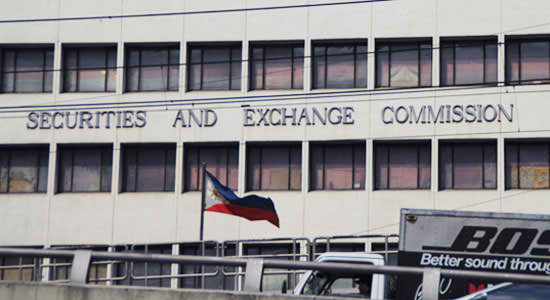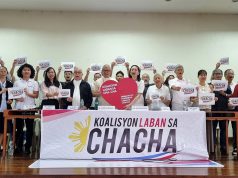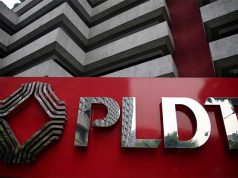MANILA – The Securities and Exchange Commission (SEC) on Monday filed criminal charges against 153 people, including 67 Indian nationals, for falsification, perjury and violations of the Lending Company Regulation Act.
EC Commissioner Emilio B. Aquino, Supervising Commissioner for Enforcement, said the SEC Enforcement and Investor Protection Department (EIPD) filed 18 criminal complaints at the City Prosecutor’s Office of Pasay City against the officers, directors, stockholders, agents and a number of John Does, connected with the following lending firms:
(1) 7 Lions Lending Management Corp. (2) Amsuda Lending Corp. (3) Bhati and Jogi and Swali Lending and Trading Corp. (4) Dr. Verma Lending Corp. (5) Maan & Bhaker Landing Inc. (6) Manak Pur Lohara Lending Corp. (7) Paramjit Harvinder Gold Lending Inc. (8) Purewal and Rashpal Lending Inc. (9) Divya and Kavita Lending Corporation (10) Satguru Lending Corporation (11) Sartaj Lending Inc. (12) All In 7000 Lending and Trading Corp. (13) Balak1008 Lending and Trading Inc. (14) Star 77777 Lending and Trading Inc. (15) Chardikla 786 Lending and Trading Inc. (16) Naurasidhu55 Lending and Trading Corporation (17) Phil 86 Gurunanak Lending and Trading Corp. (18) X-Ceee86 Lending and Trading Inc.
Section 4, Republic Act No. 9474 otherwise known as the Lending Company Regulatory Act of 2007, states that a lending company shall be established only as a corporation x x x and that xxx No lending company shall conduct business unless granted an authority to operate by the SEC.
Section 5 of that law also sets the minimum paid in capital of any lending company at P1 million. Hence, the SEC, as administrator of such law, requires applicants-entities for CAs to submit a notarized bank certificate as proof of deposit of their paid in capital.
However, the SEC’s Company Registration and Monitoring Department, receiver and processor of applications for CAs, made a disturbing discovery in the course of evaluating said applications. A number of applications had bank certificates bearing the stationery of one bank branch, but signed by a bank representative of another branch. The SEC also found application documents having the same entries /contents of business plans with the same corrections appearing to be prepared or filed by one and the same person.
Also, applicants whose principal office addresses were outside Metro Manila submitted bank certificates of one and the same bank and branch located in Pasay City, Metro Manila.
Commissioner Emilio B. Aquino said that after further inquiry and investigation, the SEC’s Enforcement and Investor Protection Department (EIPD) found the bank certificates were fake and not issued by the subject bank at all.
Representatives from the subject bank, in a letter to the SEC, categorically denied having issued the submitted bank certificates. It verified that the account numbers indicated in the bank deposit certificates were not issued by the subject bank since they use a different bank code.
On the basis of these, the EIPD filed before the Office of the City Prosecutor of Pasay City, a criminal action for falsification of public and commercial documents under Article 172 of the Revised Penal Code and violation of Section 12 (3) (a) of RA 9474 against the directors, officers, and stockholders of the applicants-entities.
“We will prosecute those submitting fake bank certificates. The SEC shall be the complainant. For sure the SEC was indeed misled by the bank certificates as proof of paid in capital,” said Commissioner Aquino.
For the fraud they perpetrated in procuring CAs, the SEC will revoke the Certificates of Incorporation or primary registration of those entities found to have submitted spurious documents but have already received their CAs. Further, they shall face the possibility of a perpetual ban from ever establishing a lending company again.
“We also plan to blacklist all company service providers/facilitators who had a hand in submitting these spurious documents,” he added.
Per Section 12 of RA 9474, a fine of not less than P10,000 and not more than P50,000 or imprisonment of not less than six months but not more than 10 years or both, at the discretion of the court, await: “3. Any officer, employee, or agent of a lending company who shall: a. Knowingly and willingly make any statement in any application, report, or document required to be filed under this Act, which statement is false or misleading with respect to any material fact; x x x”
In continuing the onslaught against violators of RA 9474, recently, the SEC revoked the primary registrations as corporations of 1,248 entities (as of July 04, 2017) which have not obtained their CAs despite the long period given them to secure the latter. The number is projected to increase as more entities are currently being reviewed and monitored.
RA 9474 was approved on May 22, 2007 and one year after the effectivity of the Act or on June 12, 2008, all entities engaged in lending activity should have secured their corresponding CAs.
Nonetheless, the SEC still gave entities until April 30, 2017 as last chance to comply.
Commissioner Aquino noted that entities have been given more than sufficient time to comply with the law; hence, their continued noncompliance warrants the revocation of their primary registrations. “They have been given more than sufficient time to comply and the President himself has been vocal about ridding the country of these entities engaged in illegal lending and we will end their illegal ways by revoking their primary registrations”.
Besides revoking the primary registrations of entities which have actually registered but did not secure CAs, the SEC also prosecutes those who, without any primary registration and CA, actually engage in lending. It recently charged one Rosalie Daro, caught extending a loan to a poseur-debtor at the Antipolo Public Market, Antipolo City.
In that operation, the SEC partnered with the NBI to arrest Daro who was caught in the act of engaging in unlawful extension of loans during an entrapment operation. As earlier mentioned, under Section 4 of RA 9474 only a registered lending company with CA can conduct a lending business. “The SEC takes very seriously its mandate to uphold the laws it administers. We will not back down against these illegal lenders. They have to legitimize, incorporate, and obtain proper licenses. There is a law that requires them to do so. Until they comply with the law, we will run after them and charge them,” Commissioner Aquino added.
In combatting illegal lending in the country, the SEC also sought the input of the Embassy of India in Manila.
The Embassy officials vowed to help the SEC in stamping out illegal lending by conducting lectures and seminars on the need for registration of lending businesses. Many Indian nationals in the Philippines are engaged in lending business.
Several months ago, President Rodrigo R. Duterte, whose administration is pursuing inclusive growth and financial inclusion, made a call to rid the country of illegal and unregistered lenders.
A similar call was made by Finance Secretary Carlos G. Dominguez and Justice Secretary Vitaliano Aguirre II. Since the SEC crackdown, there has been a corresponding increase in registration of lending firms in the first half of 2017 – with 393 companies, compared to the same period last year of only 73, or a significant increase of 438%.










